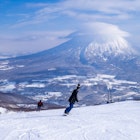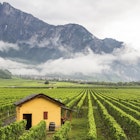

The ski slopes at Kranjska Gora are located conveniently close to the village © Iztok Medja / Slovenian Tourist Board
The beautiful central-European country of Slovenia is home to some of the best-value skiing in the Alps. The majestic mountain peaks of the Julian Alps surround several small, picturesque ski resorts, most of which are under an hour’s drive from the nearest airport. Accommodation and lift passes are affordable and pistes are generally uncrowded. Although most of the ski areas are quite small, it’s possible to combine multiple resorts in a single trip, allowing visitors to sample the unique terrain and warm welcome.
Vogel is the only ski area situated within Triglav National Park, and benefits from an almost unbelievably picturesque location, surrounded by towering mountains and with views over Lake Bohinj towards Mt Triglav, Slovenia’s highest peak.

Despite its relatively diminutive size (18.5km of pistes), the area’s varied topography makes it feel much bigger, and there’s a laid-back atmosphere, perfect for carefree coasting down the well-groomed blue and red runs. When conditions are right and there’s plenty of snow, it’s also a great destination for off-piste skiing and ski touring. Most skiers stay down in the pretty Bohinj Valley, taking the high-speed gondola up from Ukanc, but there are restaurants, bars, ski-hire facilities, chalets and even a hotel up on the mountain.

Family-friendly facilities at Kranjska Gora
Uniquely for Slovenia’s major ski resorts, Kranjska Gora’s ski area is located directly next to the village, allowing many of its hotels to offer ski-in, ski-out access. The piste layout is compact and straightforward, with several parallel lifts providing access to a range of side-by-side nursery, blue and red slopes. It’s a perfect proposition for families and beginners, as it’s virtually impossible to lose anyone and super-easy for parents to swing by and check on their kids in ski school.
Plenty of artificial-snow cannons make up for the relatively low altitude, and night skiing until 10pm makes it easy to pack plenty of slope time into even a short visit. More advanced skiers can test their mettle on the steeper red and black runs over the hill in Podkoren, including a challenging world-cup downhill run that seems almost vertical in places.

Cross-border skiing at Kanin
Slovenia’s highest ski area, right on the border with Italy, Kanin reopened in the 2016–17 season after refurbishment of the cable-car connecting it to the town of Bovec in the Soča Valley below. In contrast to the Cold War era, when the border with Italy was guarded by soldiers with guns, skiers can now pass freely across into Italy thanks to a state-of-the-art cable-car connection with the resort of Sella Nevea.
Kanin’s runs are sunny and south-facing, ideal during chillier conditions, whereas Sella Nevea’s north-facing runs come into their own as conditions warm up. The scenery on both sides is spectacular, with dramatic rocky outcrops and views all the way to the Adriatic sea on clear days. Thanks to high altitudes of up to 2300m, conditions remain good into the spring, allowing the unique possibility of combining winter- and water-sports in the same holiday once the rafting season has begun in mid-March down in the Soča Valley below.

Ski pass options
Although most of Slovenia’s ski areas are relatively small, suitable for beginners, families and those on short breaks, a great option for more experienced skiers is to combine more than one resort in the same holiday, using the Julian Alps International Ski Pass. This currently covers the Slovenian resorts of Kanin, Kranjska Gora, Krvavec (30km of pistes located close to Ljubljana’s airport), Cerkno (a family-friendly area incorporating a thermal spa) and Soriška Planina. The pass also includes six nearby resorts in Italy and three in Austria.
Though not a winter-sports hub itself, picture-postcard Bled, with its pretty lake and castle, is located just a 35-minute drive from Vogel, Kranjska Gora and Krvavec. You can sometimes get a great deal by buying your ski pass as a package with accommodation in Bled.

Cross-country skiing and biathlon at Pokljuka
The Pokljuka Plateau is the perfect place to get back to nature, skiing through towering coniferous forests and beautiful alpine meadows, without the infrastructure and hustle-bustle of a major ski resort. The heavily forested plateau is situated on the eastern edge of the Triglav National Park at an elevation of around 1100 to 1400m.
Slovenia’s prime destination for cross-country skiing, it has over 30km of cross-country tracks that snake through the peaceful forests and out into sunny meadows that become pastures for cows in summer. Visitors can hire equipment and take lessons in cross-country skiing, and also try their hand at biathlon (a combination of skiing and shooting), using an air rifle.

Learn to ice-climb in the Mlačca Gorge
Adventurous types who dream of strapping on crampons, wielding a pair of ice axes and hacking their way up a frozen waterfall will find that it’s easy to turn their ice-climbing dreams into reality in Slovenia. The ideal place to get started is the Mlačca Gorge, not far from Kranjska Gora, where local ice-enthusiast Pavel Skumavc creates artificial waterfalls each winter by trickling water down the frozen cliffs each night.
Skumavc welcomes complete beginners to his frozen wonderland (booking required: [email protected]), and provides all the equipment and training needed to scale his icy creations in complete safety. Soon climbers are perched precariously on the tips of their crampons several metres above the ground, swinging their ice axes with wild abandon as shards of loose ice shower down from above.
You might also like:
Skiing in Bulgaria: a beginner’s guide to Bansko
Budget skiing: how to save money on the piste
Eternal winter: where to ski every month of the year
Anna Tyler travelled to the Slovenian Alps with support from the Slovenian Tourism Board and Wizz Air (wizzair.com). Lonely Planet contributors do not accept freebies in exchange for positive coverage.
Article first published in March 2017, and last updated in November 2019.
Explore related stories









